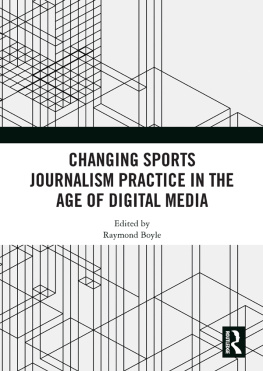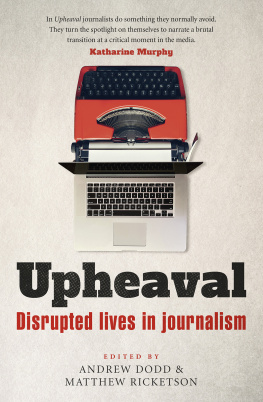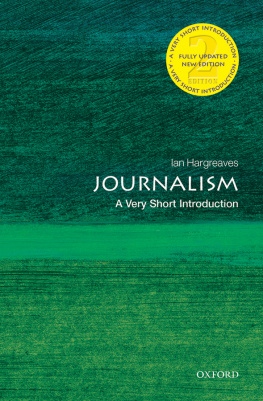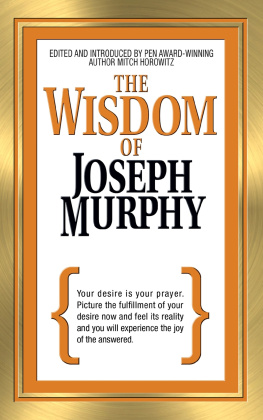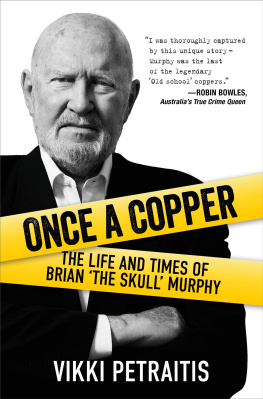
Katharine Murphy has been a journalist in Canberras parliamentary press gallery for two decades, and is now political editor of Guardian Australia. She is the host of the political podcast Australian politics live and a regular pundit on television and radio, including the ABCs Insiders program. She regularly contributes to Meanjin.
Little Books on Big Themes
Sarah Ferguson On Mother
Nikki Gemmell On Quiet
Blanche dAlpuget On Lust & Longing
Leigh Sales On Doubt
Germaine Greer On Rage
Barrie Kosky On Ecstasy
David Malouf On Experience
Don Watson On Indignation
Malcolm Knox On Obsession
Gay Bilson On Digestion
Anne Summers On Luck
Robert Dessaix On Humbug
Julian Burnside On Privilege
Elisabeth Wynhausen On Resilience
Susan Johnson On Beauty
Katharine
Murphy
On
Disruption

MELBOURNE UNIVERSITY PRESS
An imprint of Melbourne University Publishing Limited
Level 1, 715 Swanston Street, Carlton, Victoria 3053, Australia
www.mup.com.au

First published 2018
Text Katharine Murphy, 2018
Design and typography Melbourne University Publishing Limited, 2018
This book is copyright. Apart from any use permitted under the Copyright Act 1968 and subsequent amendments, no part may be reproduced, stored in a retrieval system or transmitted by any means or process whatsoever without the prior written permission of the publishers.
Every attempt has been made to locate the copyright holders for material quoted in this book. Any person or organisation that may have been overlooked or misattributed may contact the publisher.
Text design by Alice Graphics
Cover design by Nada Backovic Design
Author photograph by Penny Bradfield
Typeset by TypeSkill
Printed in Australia by McPhersons Printing Group

9780522873795 (paperback)
9780522873801 (ebook)
To the memory of Michael Gordon, who
lived this, taught me so much, and left us
too soon.
I t was the fag end of summer and I was decked out in a new linen three-piece suit from Sportscraft. Im not sure why the suit seemed necessary, particularly one tailored for a generic 40-year-old professional woman when I was in my mid twenties, but Id never been a journalist before. Did journalists wear suits? Id only ever seen journalists socially, or talked to them on the phone. If they did suit up for the office, would it be power suits, or something more low-key in the suit range? This was a point of anxiety, but I was intent on making a good impression. I knew I only had one shot.
In early February 1996, I sat at the Senate entrance of Parliament House waiting for one of my new colleagues to come downstairs and sign me in, my stomach full of butterflies. The costume masked my deep sense of inadequacy. I knew full well Id talked myself into a job I wasnt at all qualified to do. Do not screw this up, my hyper-alert brain said; an internal monologue, Shoulders back, chin up. Smile for Christs sake.
As soon as I entered the office the ludicrousness of the suit became clear. The Canberra bureau of the Australian Financial Review wasnt a place for suits outside of parliamentary sitting weeks. The drab cubicles overflowed with paper. Yellowing front pages were tacked on the walls. A couple of plants wilted in the windows. The people sitting inside the cubicles were not in suits.
My new colleagues looked at the suit and at me and then looked back at the suit. As kind as they were, I was as exposed as if I had walked into the office naked. I can still see the look on David Shiress face, the chief of staff; his polite attempt to hide his wry amusement from me until he swivelled his chair back around to his screen.
Before that day, Id been a public servant. Id finished university in 1991 and no one was landing their dream job in 1991. Your dream was to get a job. In the middle of a recession, opportunity seemed scarce.
I lucked out and got a graduate position in Canberra. I wore my mothers clothes for that interview because buying a suit was an extravagance beyond my meagre student means. I was interviewed for the Department of Industrial Relations by a woman who appeared deeply fascinated by the fact I wrote my honours thesis on Sylvia Plath. She felt, and said as much, that the department was chock full of economists and lawyers. Her view was the bureaucracy needed the odd alternative type.
Somehow, by sheer luck, as the designated alternative type, the kooky creative, I was packing a large bag for the train to Sydney and the overnight bus to Canberra. I had a farewell drink in my local pub with my friends and was berated by a friend-of-a-friend who had failed to get a graduate spot in either Treasury or the Department of Industrial Relations despite having a first-class honours degree in economics from Sydney University. How the fuck did you rank ahead of me? was his not very cheery but not unreasonable bon voyage.
So it was fair to say the moment at the end of the summer of 1996 was not my first experience of being an impostor. But walking into political journalism, into one of the Canberra parliamentary press gallerys most high-performing bureaus, was a different experience from talking my way into the bureaucracy courtesy of a willing and broad-minded patron because I had no obvious career alternative.
Journalism was something I wanted to do and I couldnt quite believe it was beginning to happen.
The Fins affable bureau chief, Tom Burton, affectionately dubbed The Guru by the young smart-arses of the office at that time, had taken me on after persistent prodding from a mutual friend of ours. Burton was comfortable with lateral hires, and so, fortunately, was the paper. Burton had worked inside the Canberra sausage factory before making the leap to journalism, and the papers view was public servants were useful, because they were interested in policy and they understood how Canberra worked.
The Fin view of that time, or at least Burtons view as he expressed it to me, was people could be taught to write a news story, but it was harder to teach them how Canberra functioned, and it was harder for newcomers out of journalism school to build up the network of public service contacts I had already accumulated.
I arrived at the bureau during Paul Keatings last few weeks in the Lodge. The team was preparing for an election and me turning up in the middle of it mustnt have been that helpful. If my colleagues were resentful, they hid it well. The Guru thought bureaus worked best when they worked together. Unusually for a newspaper man, he was interested in managing people rather than letting headstrong rival correspondents slug it out in bursts of survival of the fittest. That inclusive disposition set the tone of the office. Various people, including Tom, kept me afloat over the few weeks we had before Keating materialised in the prime ministers courtyard to call the election.
There were a lot of joint by-lines, which really meant a lot of ghost writing, both in Canberra and in Sydney by news editor Pam Walkley, an experienced and highly efficient Scot, who had a habit of laughing as the daily deadlines crept closer. The more Pam laughed, the more she was under the pump. Pams laugh was our daily barometer. Were we under control, or out of control?
Next page

